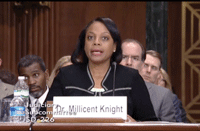“The policies boil down to this,” stated Sen. Amy Klobuchar (D-MN), chairman of the Judiciary Antitrust Subcommittee. “A manufacturer tells retailers that if they want to sell a particular lens, then they can’t sell [that lens] below a price set by the manufacturer. If a retailer sets the lenses for below that price, then the supply of that particular contact lens would be cut off.”
UPP means that any retailer—including independent optometrists, national chains, big box stores or online retailers—can’t discount those contact lenses that are subject to this agreement below a certain price, Sen. Klobuchar said.
For consumers, this means that no coupons, rebates or discounts can lower the cost of the lens below the manufacturer’s set price. “This does raise legitimate questions about what the policies will do to competition and what kind of prices consumers will be paying because of these policies,” Sen. Klobuchar said.

| |
|
Millicent L. Knight, OD, defended the unilateral pricing policing of Johnson & Johnson Vision Care's contact lenses.
|
Millicent L. Knight, OD, who represented Johnson & Johnson Vision Care at the hearing, testified that most consumers would pay lower prices as a result of UPP. For example, unilateral pricing will solve the inequity of rebates. “Our data suggests that somewhere between [only] 6% and 8% of all Acuvue consumers actually redeem rebates in order to receive the best prices offered by a retailer,” she said. “UPP creates greater accessibility to lower prices for everyone, not just the few patients that remember to send in their rebates correctly.”
David A. Cockrell, OD, who represented the American Optometric Association, also addressed the eradication of consumer rebates and competitive costs. “I think having one [unilateral] price eliminates a lot of price confusion,” he said.
George Slover, senior policy counsel for Consumers Union, countered: “If the goal is to lower prices, it’s more logical to put a maximum ceiling on the retail price—and to allow the retailers to go below that if they want to—than to put a floor on the price and allow the retailers to go above that.”
R. Joe Zeidner, general counsel for 1-800 Contacts, testified that UPP would decrease consumer choice. Currently, the contact lens wearer is “told what brand you’re going to get, then you go and shop for where you want to purchase it. That is being taken away,” he said. “Because … after UPP, you’re prescribed a brand and you have to pay that price. So it’s really not like any other consumer product, and that’s because you have a medical professional who’s selling what they’re prescribing in the office.”
At the end of the hearing, Sen. Klobuchar said that the subcommittee will revisit this issue in a few months to investigate how prices have affected consumers.

